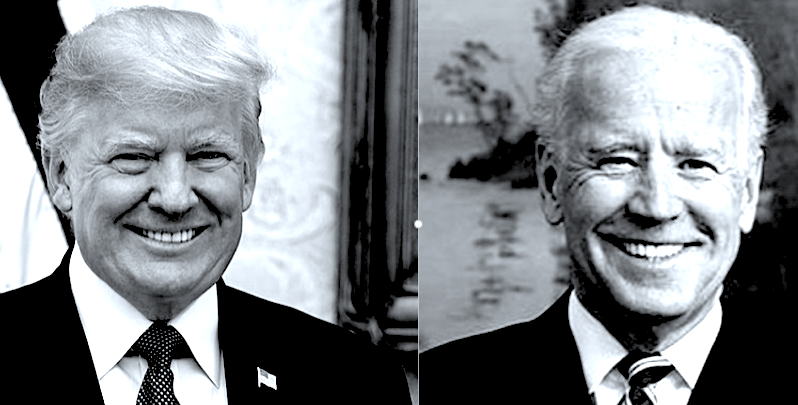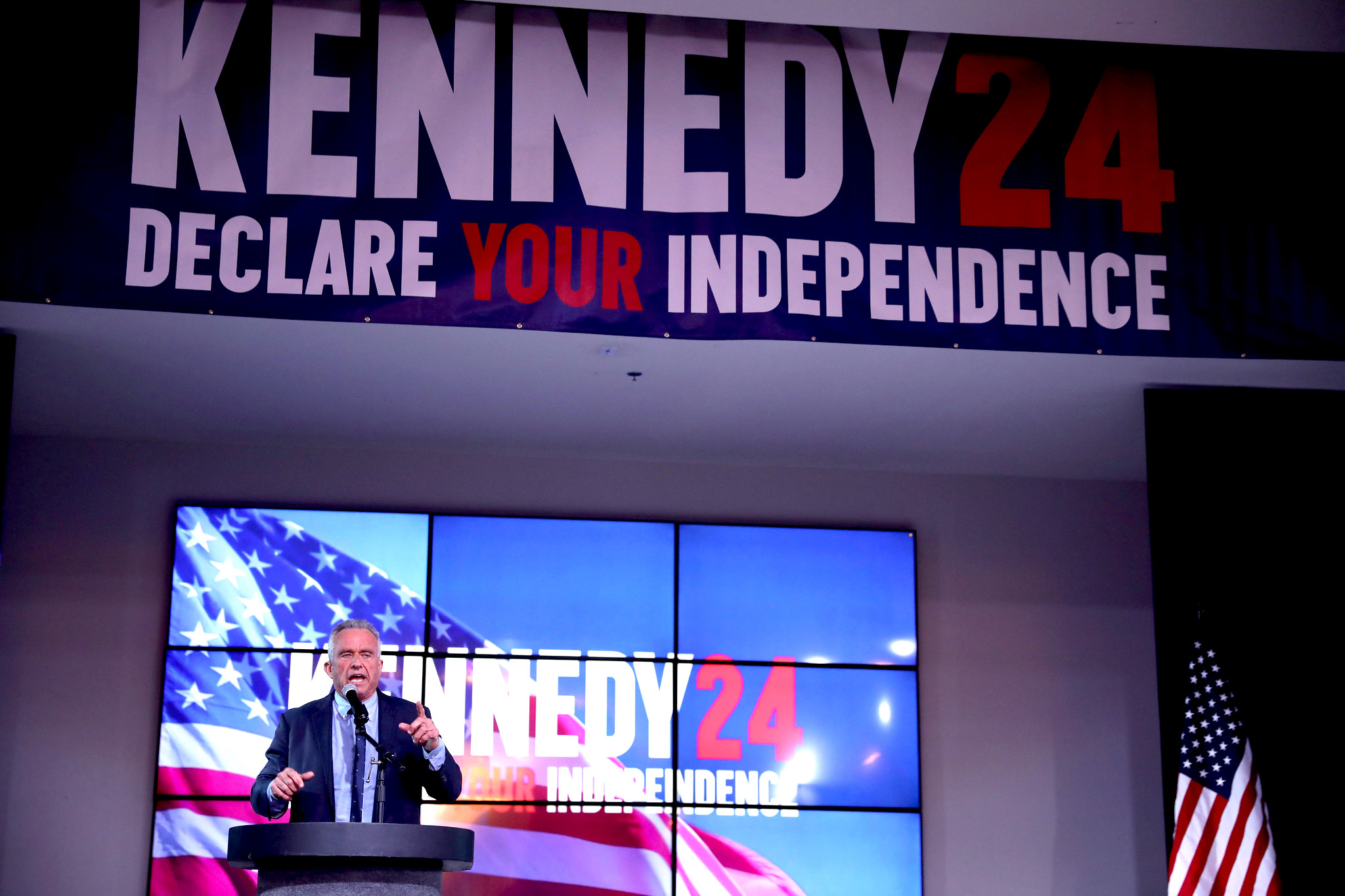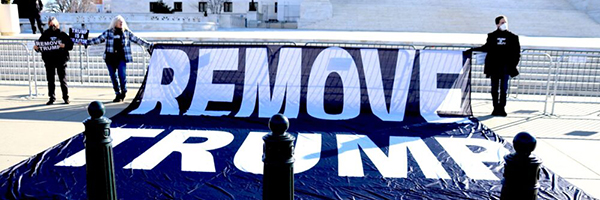The deep crisis of U.S. democracy is not just the fault of one party, writes Nat Parry. The anxiety over the loss of democracy in the United States actually cuts across party lines.
Heading into the 2024 U.S. presidential election season, a Quinnipiac poll has found that “preserving democracy” is the top concern of American voters, coming in just ahead of immigration and the economy.
A total of 21 percent of respondents said that democracy is the country’s No. 1 issue, with climate change, health care, crime, racial inequality and international conflicts lagging far behind.
The focus on democracy appears — at first glance — to be good news for Joe Biden, with significantly more Democrats than Republicans citing it as their top issue (32 percent and 13 percent, respectively).
Correspondingly, the president has made “defending democracy” against the supposed threat posed by Donald Trump a central theme of his re-election campaign.
A Biden campaign strategy memo has identified Trump as “an existential threat to democracy,” and Biden, casting himself as the only bulwark protecting the nation from tyranny, has asserted that Trump “wants to be a dictator.”
Driving the point home, Biden went to Valley Forge, Pa., in early January to use the historic Revolutionary War site as a backdrop to rally supporters.
In a campaign speech intended to also mark the third anniversary of the Jan. 6 breach of the Capitol, Biden called the defense of democracy “the most urgent question of our time,” and claimed that Trump is “willing to sacrifice our democracy, put himself in power.”
“Whether democracy is still America’s sacred cause is what the 2024 election is all about,” Biden said.
The problem for Biden, however, is that anxiety over the loss of democracy in the United States cuts across party lines.
Just 38 percent of Americans express satisfaction with the level of democracy in their country, and although the Quinnipiac poll found that Democrats rank it as their top issue, there are strong indications that Republicans are just as — if not more – passionate about it than Democrats.
Democracy Gap

Donald Trump and Joe Biden, official portraits from Wikipedia. (Andrea Widburg, Flickr, Public Domain)
A 2022 survey found that 33 percent of liberals believe they can substantially influence American politics, but only 22 percent of conservatives feel the same way.
It was perhaps this feeling, combined with a profound lack of trust in the electoral system, that led Trump’s ardent supporters to attack the Capitol and temporarily halt Congress’s certification of the election results on Jan. 6, 2021.
While this “insurrection” confirmed in the minds of many Democrats that Trump would stop at nothing to maintain power, in the minds of many Republicans, this was a principled defense of the republic.
As Proud Boys member Marc Bru said upon receiving a six-year sentence for his role in the Jan. 6 protest, “You can give me 100 years and I’d do it all over again.”
Regardless of party identification, what is clear is that a vast majority of people across the political spectrum feel they have little to no control over what is seen as a largely unaccountable government.
On a wide range of issues, there is a palpable sense that the views of ordinary citizens are routinely ignored by the ruling elite.
These sentiments have been backed up by academic scholarship, with research by Martin Gilens of Princeton University and Benjamin I. Page of Northwestern University determining that public opinion has a negligible impact on public policy.
“Ordinary citizens have little or no independent influence at all,” Page says, noting that when 60-70 percent of Americans favor a particular policy change, that change has been implemented only about 40 percent of the time.
 What influences policy, according to Gilens and Page, is not public opinion but private wealth.
What influences policy, according to Gilens and Page, is not public opinion but private wealth.
In a 2017 book entitled Democracy in America?, they write that “through campaign contributions, lobbying, influence over public discourse, and other means, wealth can be translated into political power.” America’s historic levels of wealth inequality ensures that political power is held in relatively few hands, they point out.
While Gilens and Page examined decades worth of data from thousands of public opinion surveys and federal policy decisions to inform their conclusions, most average people seem to understand this democracy gap on a visceral level.
Many of them blame America’s out-of-control campaign finance system for sidelining the voices of average citizens, with some 85 percent of Americans believing that the cost of political campaigns prevents good people from running for office.
Polls have also consistently found that Americans — in theory at least — support more options on the ballot than those offered by the two-party system.
For the past several years, more than 60 percent of Americans have indicated that the Republican and Democratic parties do “such a poor job” of representing the American people that “a third major party is needed.”
Despite this discontent, however, third parties and independents continue to struggle to gain traction.
In the same Quinnipiac poll that found that “preserving democracy” was the top issue facing the country, Green Party candidate Jill Stein and independent candidate Cornel West each received just 3 percent support, while independent Robert F. Kennedy Jr. received 15 percent.
Although these numbers may seem incongruent with the more than 60 percent who desire additional options, it should be noted that the campaign season is still early and that when it comes to RFK Jr., at least, his poll numbers could help him get into the televised presidential debates, which would substantially boost his profile.
The Commission on Presidential Debates has historically used 15 percent support as the threshold to allow independents and third party candidates into the debates, so – assuming they don’t change their rules – there is a good possibility that there will be more than two people on the stage this year.
Undemocratic Tendencies

Kennedy at a campaign rally in Phoenix in December 2023. (Gage Skidmore, Flickr, CC BY-SA 2.0)
But even with some early, promising indications of a more democratized election, other trends point in the opposite direction.
In a sign that the Democrats are growing concerned about Kennedy’s campaign, the Democratic National Committee filed a complaint with the Federal Election Commission on Feb. 9 claiming that the American Values 2024 PAC is improperly coordinating with the Kennedy campaign to help get him on state ballots.
As Politico reports, “the complaint is unlikely to go anywhere” since the hopelessly divided FEC almost always deadlocks on enforcement questions, “but it signals that national Democrats are dialing up their efforts to target Kennedy, the current leading non-major party presidential candidate, over fears that he may siphon votes away from President Joe Biden in this year’s election.”
Although it is nothing unusual for the two major parties to attempt to remove independents and third parties from ballots, what makes Election 2024 unique is that the likely Republican nominee is also being targeted for removal.
In a December 2023 Colorado Supreme Court decision disqualifying Trump from the ballot in the key battleground state, a majority held that
“the events of January 6 constituted a concerted and public use of force or threat of force by a group of people to hinder or prevent the U.S. government from taking the actions necessary to accomplish the peaceful transfer of power in this country.”
The court also determined that Trump “aid[ed] or further[ed] the insurrectionists’ common unlawful purpose of preventing the peaceful transfer of power,” namely by “exhort[ing] them to fight to prevent the certification of the 2020 presidential election.”
Because of this, the court declared that Trump is ineligible to be president under Section 3 of the Constitution and should therefore not be listed on the ballot.
Still shaken by the events of Jan. 6, 2021, many Americans may consider drastic measures such as these warranted to shore up America’s democracy.
It remains to be seen whether the U.S. Supreme Court allows this decision to stand, but based on the justices’ questioning during the hearing on Feb. 8, court watchers seem to think that it will likely overturn the Colorado ruling.
Regardless of what happens at the Supreme Court, however, the trend is clear: using the courts and all other methods at their disposal, Democrats are willing to engage in unprecedented actions to ensure that the “sacred cause” of democracy is defended at nearly any cost.
Democracy Under Attack
Former Democrat Tulsi Gabbard, for one, doesn’t accept this line of reasoning. Rather than defending democracy from would-be tyrants, Gabbard believes that the elites are so terrified that Americans will make the “wrong” choice in Election 2024, they have decided to protect voters from themselves by “destroying our democracy and taking away our freedom.”
In a speech last week to the Conservative Political Action Conference, Gabbard declared that “our democracy is under attack,” and that those attacking it are doing so “in the name of saving our democracy.”
It is “the Democrat elite and the swamp creatures in Washington who are doing all that they possibly can to keep us the American people from a very simple thing – having the freedom to choose who we want to be our next president,” Gabbard warned.
“And it is clear through their actions they have no respect for us and they have no respect for our rights as citizens of this democratic republic,” she said.
What is also clear is that as Election 2024 heats up, the historic levels of distrust between America’s political factions will continue to grow.
With both sides perceiving each other as grave threats to the republic and neither fully articulating a clear understanding of how democracy is actually being eroded, the solutions that they advocate could very well have the effect of eroding it further.
*
Nat Parry is the author of the forthcoming book Samuel Adams and the Vagabond Henry Tufts: Virtue Meets Vice in the Revolutionary Era. He is editor of American Dispatches: A Robert Parry Reader.

